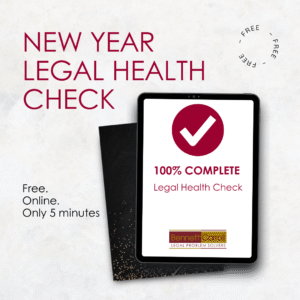
Protecting Your Business in a New Relationship: A National Guide for Entrepreneurs
If you are a business owner who has spent years building an enterprise in Australia, you understand risk management. You have insurance for your premises
Whether you’re starting a new venture, reviewing a lease, or facing a business dispute, the right legal advice can make all the difference. At Bennett Carroll Solicitors, our experienced commercial lawyers help Queensland businesses navigate contracts, transactions, compliance, and conflicts with clarity and confidence.
We service all of Queensland—no matter where you’re located, we can assist you via phone, email, or video conference, with physical offices in Brisbane, Gold Coast, Sunshine Coast and Ipswich. Prefer to meet in person? We can even come to you.
We offer clear, strategic legal support at every stage of your business lifecycle:
Set your business up for success. We help you choose the right legal structure sole trader, partnership, company or trust, based on your goals, tax position, and liability protection.
Read: Navigating Business Structures – A Guide to Setting Up Your Business
Clear contracts = less risk. We draft, review and advise on all types of business contracts, including:
Service and supply agreements
Contractor and subcontractor agreements
Partnership agreements
Terms and conditions
Franchise agreements
Read: Demystifying Business Contracts – Essential Dos and Don’ts for Queensland Entrepreneurs
Your lease can affect the future of your business. Whether you’re negotiating a new lease, renewing, or assigning, we help you understand your rights and avoid nasty surprises.
✅ Capped fee lease reviews
✅ Advice on make-good clauses, rent increases, outgoings, demolition clauses
✅ Retail, office, industrial, franchise leases
Read: Five Reasons Why You Should Have Your Commercial Lease Reviewed
Read: Commercial Leasing in Queensland – Legal Advice for Tenants & Landlords


We provide expert commercial law services to businesses across Brisbane, the Gold Coast, the Sunshine Coast, and Ipswich and all across Queensland. Whether you prefer face-to-face consultations or a fully online legal service, our team is here to assist you.
📍 Brisbane North – Stafford
📍 Brisbane South – Upper Mount Gravatt
📍 Gold Coast – Mermaid Beach
📍 Sunshine Coast – Birtinya
📍 Brisbane Central & Ipswich – By Appointment
Book a Consultation Now – Secure Your Business’s Future with Expert Legal Guidance!
We handle the entire legal process so you can focus on the deal. Our team will:
Review contracts and financial terms
Conduct legal due diligence
Advise on GST, stamp duty, leases, and employee transfers
Draft or review vendor finance or WIWO (walk-in walk-out) agreements
Read: Vendor Finance Agreements – What Are They and How Do They Work?
Read: Understanding WIWO – Walk-In Walk-Out Contracts
Disputes don’t have to derail your business. We offer fast, cost-effective resolution strategies, including:
Negotiation and dispute avoidance
Mediation and arbitration
Litigation, where necessary
We handle partnership breakdowns, shareholder disputes, contract breaches and more.
Read: When Business Partners Fall Out – Resolving Partnership Disputes in Queensland
Read: Shareholder Disputes in Queensland – A 5-Part Guide
Make sure your workplace practices are legally compliant. We advise on:
Employment contracts & workplace policies
Independent contractor agreements
Unfair dismissal & employee disputes
Restructures and redundancies
Read: Unfair Dismissal in Queensland – Your Rights Explained
No nasty surprises. We offer capped fees for reviewing key business documents, including:
Business sale agreements
Commercial leases and subleases
Employment or subcontractor contracts
Loan agreements, guarantees, and building contracts
Franchise documentation
Retirement village contracts
You’ll receive a plain English letter of advice and a chance to ask questions. Searches may incur additional fees.
While your commercial contracts protect your operations, a Binding Financial Agreement (BFA) protects your ownership. In Australia, your business is often considered the most significant asset in a “property pool,” and under de facto laws, a partner may gain a legal claim to your shares or intellectual property without you ever saying “I do” or even moving in together. We specialise in “ring-fencing” commercial interests for entrepreneurs across Australia (excluding WA), providing a 100% digital process to ensure your personal life never compromises your business succession plan.
[Read our National Guide for Entrepreneurs] | [Download the Free BFA Readiness Pack]
Let’s talk about your business. Whether it’s a contract, lease, dispute or transaction, we’ll provide cost-effective, commercially sound legal advice, wherever you are in Queensland.
Contact us now or use the live chat below
Call 1300 334 566
Email here
Helpful Resources for Queensland Business Owners
Visit ASIC, Fair Work Ombudsman, or Business Queensland for further government guidance on running your business.
At Bennett Carroll Solicitors, we provide expert legal insights to help you navigate every stage of your business journey. Explore our articles below to find the guidance you need. Click title to view article.
Commercial lawyers can assist people involved in a business in a variety of manners that can avoid costly and time-consuming litigation in the future. Businesses are required to comply with various pieces of legislation controlling matters such as taxation and employment conditions, and so it is important to consult an expert commercial lawyer when you are unsure of your specific rights and responsibilities.
Commercial lawyers can also assist in the structuring and reviewing of contracts, including employment contracts, leases, sales of business and land, and client agreements. By consulting a commercial lawyer, you can ensure that any agreement is structured so that its terms and conditions benefit you (or your client), and that it is legally binding and valid.
As well as preventative measures, commercial lawyers can also benefit a business once a legal issue has arisen. Specific areas in which a commercial lawyer can assist include debt recovery, workplace disputes and unfair dismissal claims.
The decision of which business structure is best suited to your business will depend on a number of factors, and can have important implications for taxation, licenses required, the control over your business and personal liability. It is therefore important to consult an expert commercial lawyer before making such an important decision, to fully understand the various pros and cons of each structure.
The simplest business structure is a sole trader. A sole trader business is relatively inexpensive to create and maintain, and gives you complete control over the business. However, as a sole trader, you are personally liable for any losses or lawsuits against the business.
A partnership is where up to 20 individuals run a business enterprise together. Like a sole trader, a partnership is relatively inexpensive to establish and maintain, and does not require income tax to be paid. As a partner, you are liable for all of the business’ debts, even if the issue arose from the actions of another partner – you are ‘jointly and severally liable’.
A company is a more complicated business structure that carries with it a variety of benefits, especially for a relatively large business. A company is a separate legal entity, which means it can sue and be sued and, importantly, gives you limited liability. Running your business as a company gives you potential tax benefits, as your tax may be able to be kept in the company or distributed to shareholders as dividends. Establishing and administering a company is more expensive, however, than a sole trader or partnership, and so may not be financially preferable for small businesses.
Finally, a trust can be employed as a business structure, often in conjunction with a company. Trusts can be expensive to operate due to the formal administrative tasks imposed on a trustee, though provide asset protection and in some cases, limited liability.
Our expert commercial lawyers can assist you in choosing which business structure is best suited to your particular business.
Commercial lawyers understand the respective rights and responsibilities of directors compared to those of shareholders. This knowledge is integral to resolving any business dispute promptly and effectively, and is often misunderstood by the parties involved.
Business disputes may be resolved through a number of methods including mediation, arbitration or negotiation. Which method is likely to provide the best outcome for your business will depend on the facts and nature of the dispute, and is something that our commercial lawyers can assist you with by explaining to you your rights and responsibilities, and the potential outcomes of each method of resolution.

If you are a business owner who has spent years building an enterprise in Australia, you understand risk management. You have insurance for your premises

The new year is more than just a date on the calendar, it’s a global tradition of renewal, setting goals, and getting your life in

Supplier disputes are one of the most common commercial issues affecting Queensland businesses. Whether a supplier delivers late, provides defective goods, overcharges, or breaches your